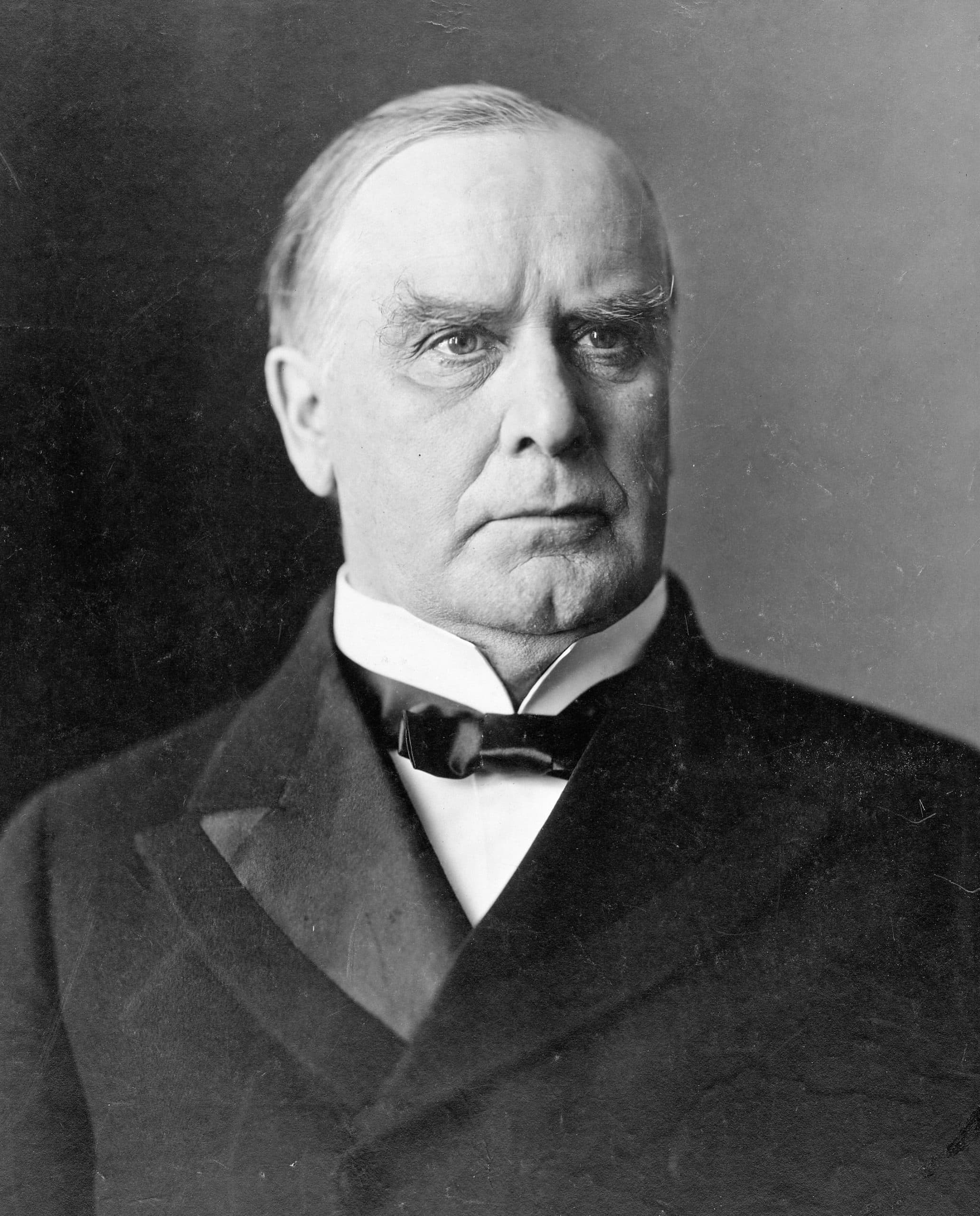President William McKinley won the election of 1896 and became the 25th President of the United States.

He had been an influential Governor from Ohio and had risen to the office of President due to his experience and connections with many business tycoons. He defeated the charismatic William Jennings Bryan.
Jump to:
During his term, he would fight a war against Spain that would be known as the Spanish-American War, which would become the quickest war in American history. Much of it was driven by public opinion, and it would place a new hero on the American landscape by the name of Theodore Roosevelt.
Roosevelt would become McKinley's Vice President during his second term. He would also become the third president to be assassinated.
First Term
March 4, 1897: McKinley is Inaugurated and delivers his address.
March 15, 1897: The Dingley Tariff Law was passed that would lead to increased prices on goods. Democrats blame McKinley for the fallout.
May 24, 1897: Congress gives $50,000 to help Americans living in Cuba
September 10, 1897: Miners in Luzerne County, Pennsylvania, receive their demand for an 8-hour workday.
December 6, 1897: McKinley delivers his first annual address to Congress. In it, he speaks of the necessity for Spanish reform in Cuba.
January 25, 1898: The U.S. battleship Maine arrives in Cuba to protect American lives.
February 9, 1898: William Randolph Hearst, publisher of the New York Journal, prints a letter written by the Spanish Minister that contains insults to McKinley. This would begin to sway public opinion in favor of a war with Spain.
February 15, 1898: The Maine explodes and sinks in the Havana harbor. This would lead to America declaring war on Spain.
March 9, 1898: Congress increases defense fund to $50 million.
March 17, 1898: The U.S. Navy reports that the ship, Maine, exploded from external factors. This would be false, but nobody would know until many years later.
April 11, 1898: Spain offers Cuba limited autonomy in order to avoid a war with the United States.
April 19 - 21, 1898: McKinley is given the authority to intervene in Cuba by Congress. He orders a blockade shortly after.
April 22, 1898: Congress passes the Volunteer Army Act. The act authorizes the formation of volunteer unity known as the First Volunteer Cavalry or the "Rough Riders" that would be led by Theodore Roosevelt.
April 23, 1898: Spain declares war on the United States
April 25, 1898: America declares war on Spain, and the Spanish-American War begins.
May 1, 1898: Commodore George Dewey leads U.S. troops to occupy Manila in the Philippines.
June 1, 1898: Congress passes the Erdman Arbitration Act.
June 10, 1898: Congress passed the War Revenue Act to raise money for the war.
June 12-14, 1898: 17,000 men leave Key West for Cuba under the command of General William Shafter.
June 21, 1898: American naval forces take control of Guam.
July 1, 1898: Theodore Roosevelt and his rough riders take control of San Juan Hill.
July 3, 1898: American naval forces destroy a Spanish fleet off the coast of Santiago.
July 7, 1898: McKinley signs a Congressional resolution that will lead to the annexation of Hawaii.
July 17, 1898: General William Shafter captures Santiago.
July 25, 1898: U.S. troops invade and take control of Puerto Rico.
August 12, 1898: Spain agrees to grant Cuba its independence and cede Puerto Rico and Guam to the United States.
August 14, 1898: Spain surrenders to the United States in the Philippines.
September 9, 1898: McKinley asks William Day to resign in order to leave a Peace Treaty Commission.
September 26, 1898: McKinley appoints the Dodge Commission to investigate the War Department.
November 8, 1898: The Midterm elections take place, and Republicans maintain control of Congress.
December 5, 1898: In his annual address, President McKinley speaks of a canal in Central America.
December 10, 1898: Peace is made between Spain and the United States in the Treaty of Paris.
January 1, 1899: The United States takes control of Cuba.
February 4, 1899: The Philippine-American War began when Philippine freedom fighters attack Americans at Manila.
May 29, 1899: McKinley orders that 3,000 - 4,000 civil jobs be exempt from examinations.
July 19, 1899: Secretary of War Russell A. Alger resigns after a report criticizes his work during the war.
September 6, 1899: The United States implements an Open Door Policy toward China.
December 5, 1899: McKinley delivers another annual address in which he lays the foundation for expanding the United States Navy.
February 5, 1900: The Hay-Pauncefote Treaty was signed between the United States and Great Britain, which allows for the creation of a canal in Central America.
March 7, 1900: McKinley signs the Gold Standard Act.
April 30, 1900: Congress passes the Organic Act
June 19 - 21, 1900: President William McKinley is nominated as the Republican candidate to run for a second term.
June 21, 1900: American military governor offers Filipino rebels amnesty.
July 5, 1900: Democrats nominate William Jennings Bryan to run for President.
November 6, 1900: William McKinley wins reelection in the Election of 1900.
December 29, 1900: The Netherlands agree to sell the Dutch West Indies to the United States.
January 10, 1901: Oil is found in Beaumont, Texas.
March 1, 1901: Congress passes the Platt Amendment.
Second Term
March 4, 1901: President William McKinley is inaugurated.
March 23, 1901: The Philippine-American War ends with the capture of rebel leader Emilio Aguinaldo
September 6, 1901: Leon Czolgosz shoots McKinley in the stomach. A little over a week later, President McKinley dies. Theodore Roosevelt was sworn in as President.
